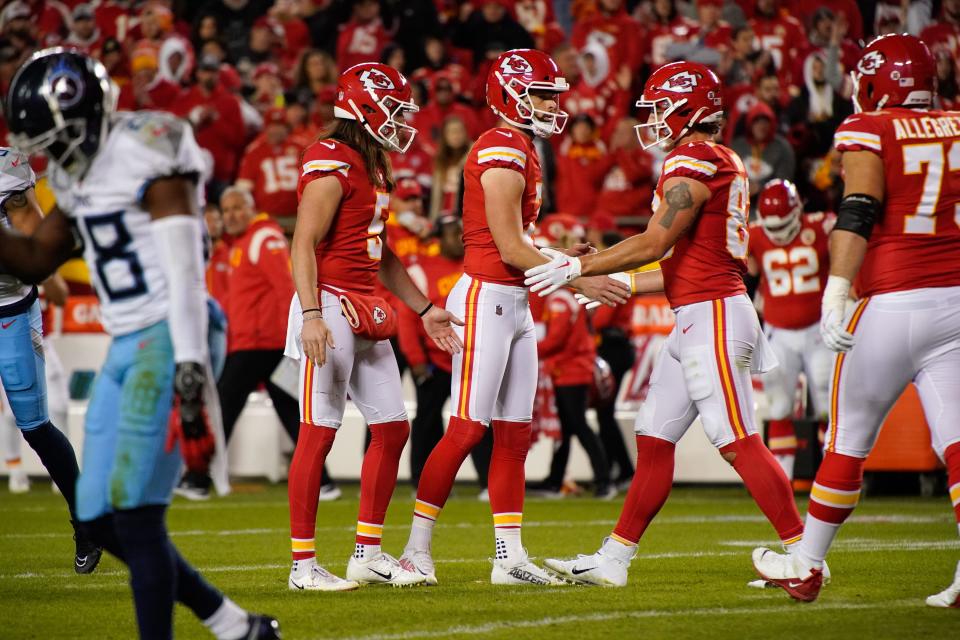Harrison Butker decries diversity, but he can thank Black QB Patrick Mahomes for his fame
On May 11, Kansas City Chiefs kicker Harrison Butker delivered the commencement speech during the graduation ceremony at Benedictine College, a Catholic liberal arts college in Atchison, Kansas.
Butker spoke at length about his Catholic faith and the importance of graduates in attendance to lean into theirs, admonishing them to choose partners and friends who share their faith, avoid moving in with their partners before marriage and regularly attend Traditional Latin Mass.
Yet none of these statements are why his speech has since gone viral. That can, instead, be credited to his perspectives on women who desire to work outside of the home, couples struggling with infertility, and the queer community.
Despite God’s instruction to love and embrace wisdom and to not be wise in your own eyes, Butker acknowledged that he spoke “not from a place of wisdom, but rather, a place of experience.” It was hard to tell if that line was a brazen display of false humility, or perhaps a way to get ahead of the ensuing media storm. Ultimately, it’s neither here nor there. Butker said that he is “a man who gets a lot of praise and has been given a platform to speak to audiences,” and in that exchange, he ultimately has the right to say, well, anything.
Butker's success is due to "DEI" efforts that brought Patrick Mahomes and other Black QBs to the game
I think it’s important, however, to acknowledge how and why he was given that platform. Butker is an NFL kicker, a position that is crucially important on the field, but decidedly less-so off of it. Kickers don’t get State Farm or Subway commercials; their jersey sales don’t sell out on NFL.com; most casual fans wouldn’t even recognize them on the street.

This is no fault of Butker’s, of course. It’s simply the way of the pro football universe, wherein running backs, receivers and especially quarterbacks — the men who put the ball in the end zone for touchdown-crazy fans —become the highly marketable faces of their respective franchises.
And speaking of quarterbacks, Butker just happens to play with Patrick Mahomes, II, who is widely considered the best quarterback in the league right now. In his first six seasons as Kansas City’s starting quarterback, Mahomes has led Kansas City’s team on a crazy run, culminating in four Super Bowl appearances and three championships. Butker, of course, has been along for the ride.

Football is a team sport, certainly, but there’s a reason why a team builds its offense to fit the quarterback and not the other way around, why the man under center is the highest paid in the sport. Harrison Butker doesn’t have three Super Bowl rings without Patrick Mahomes, and without those Super Bowl rings, he doesn’t have the aforementioned praise or platform.
It would seem, then, that Butker would be more mindful of his words, particularly his reference to the “tyranny of diversity, equity, and inclusion.” Or perhaps he doesn’t know that, as recently as a few decades ago, Patrick Mahomes’s road to NFL franchise QB and Super Bowl MVP would have been far more difficult, if not impossible. Back then, football’s decision makers believed that Black men, like Mahomes, lacked the intellectual aptitude to play quarterback and encouraged them to move to positions that were thought to rely more on physical dominance.
Mahomes and other Black quarterbacks did not listen to those who would box them in
In 2022, Mahomes spoke about the plight of Black quarterbacks after an unnamed NFL coach said he lacked a “natural pocket presence” and accused him of resorting to “streetball” when unable to convert on his first read.

“Obviously, the Black quarterback has had to battle to be in this position that we are to have this many guys in the league playing,” he said. “Every day, we're proving that we should have been playing the whole time. We've got guys that can think just as well as they can use their athleticism.”
The good news is that those shared Mahomes’s sentiments, who knew that Black quarterbacks should have always had the same opportunities as their white counterparts, didn’t listen to the white men who probably also decried the “tyranny of diversity, equity, and inclusion.” Instead, they kept showing up, kept lobbying, and kept pushing back against the forces that held Black quarterbacks out.
It’s good news for everyone — for the fans, for the league, for the Black quarterbacks themselves. It’s also great news for Butker. How else would have collected those rings? Why else would he have been given that praise, and that platform from which he could spew his nonsense?
Andrea Williams is an opinion columnist for The Tennessean and curator of the Black Tennessee Voices initiative. She has an extensive background covering country music, sports, race and society. Email her at [email protected] or follow her on X (formerly known as Twitter) at @AndreaWillWrite.
This article originally appeared on Nashville Tennessean: Kansas City Chiefs' Harrison Butker's speech ignores diversity
